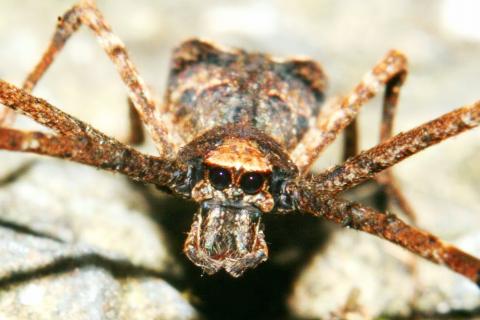A furniture shop owner from Greater Kaohsiung has cast new light on a rare arachnid known as the “ogre-faced spider.”
Hsu Kun-chin (許坤金) published his findings on the shedding and mating processes of the Deinopis spider genus in last month’s edition of the 2011 Nature Conservation Quarterly.
His publication in a magazine run by the Executive Yuan’s Endemic Species Research Institute has earned him tremendous feedback.

Photo provided courtesy of Hsu Kun-chin
Taking time out from manning his shop, Hsu joined the Kaohsiung Natural Observation Association (NOA) because of his fascination with gardening and frequently went with other like-minded friends on field trips to take pictures of ecological habitats.
During an observation trip in May 2008, he happened upon a strange type of spider in the mountains around the former Liouguei Township (六龜) that NOA chairman Chen Jen-jie (陳仁杰) later said belonged to the rare Deinopis spider genus.
The Deinopidae family consists of stick-like elongated spiders that weave unusual webs they suspend between their front legs. They then stretch the web to two or three times its initial length and cast it onto their prey, entangling it in their web.
The practice has also earned it the nickname “net-casting spider.”
Hsu said the Deinopis genus of the Deinopidae family is quite rare, both in Taiwan and abroad.
Because Deinopis are nocturnal and brown-colored, they are extremely difficult to notice when they hide amid trees in daytime, Hsu said, adding that to study the unique habits of the Deinopis more closely, he had visited the mountains 23 times.
“Though I often encountered boars and poisonous snakes on those trips, I never wavered from my goal,” Hsu said, adding that he had also brought some Deinopis spiders back home to keep.
The spiders’ nocturnal habits initially created problems for Hsu’s family, but they eventually came to support his passion after seeing how engrossed he was in his research.
During his research, Hsu discovered that the shedding process of the Deinopis did not match the description in textbooks.
Even more rare, Hsu managed to take pictures of the male Deinopis weaving a sperm web, which is used for mating.
The Deinopis’ mysterious comings and goings, as well as its particular way of hunting, are a fascinating subject, Hsu said, adding that he hoped that by sharing his observations with the public, more people would develop an interest in, and a desire to protect, the rare arachnid.
TRANSLATED BY JAKE CHUNG, STAFF WRITER

Japanese footwear brand Onitsuka Tiger today issued a public apology and said it has suspended an employee amid allegations that the staff member discriminated against a Vietnamese customer at its Taipei 101 store. Posting on the social media platform Threads yesterday, a user said that an employee at the store said that “those shoes are very expensive” when her friend, who is a migrant worker from Vietnam, asked for assistance. The employee then ignored her until she asked again, to which she replied: "We don't have a size 37." The post had amassed nearly 26,000 likes and 916 comments as of this

US President Donald Trump said "it’s up to" Chinese President Xi Jinping (習近平) what China does on Taiwan, but that he would be "very unhappy" with a change in the "status quo," the New York Times said in an interview published yesterday. Xi "considers it to be a part of China, and that’s up to him what he’s going to be doing," Trump told the newspaper on Wednesday. "But I’ve expressed to him that I would be very unhappy if he did that, and I don’t think he’ll do that," he added. "I hope he doesn’t do that." Trump made the comments in

Tourism in Kenting fell to a historic low for the second consecutive year last year, impacting hotels and other local businesses that rely on a steady stream of domestic tourists, the latest data showed. A total of 2.139 million tourists visited Kenting last year, down slightly from 2.14 million in 2024, the data showed. The number of tourists who visited the national park on the Hengchun Peninsula peaked in 2015 at 8.37 million people. That number has been below 2.2 million for two years, although there was a spike in October last year due to multiple long weekends. The occupancy rate for hotels

Taiwanese can file complaints with the Tourism Administration to report travel agencies if their activities caused termination of a person’s citizenship, Mainland Affairs Council Minister Chiu Chui-cheng (邱垂正) said yesterday, after a podcaster highlighted a case in which a person’s citizenship was canceled for receiving a single-use Chinese passport to enter Russia. The council is aware of incidents in which people who signed up through Chinese travel agencies for tours of Russia were told they could obtain Russian visas and fast-track border clearance, Chiu told reporters on the sidelines of an event in Taipei. However, the travel agencies actually applied